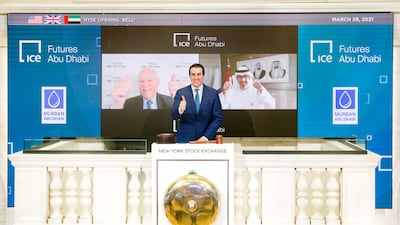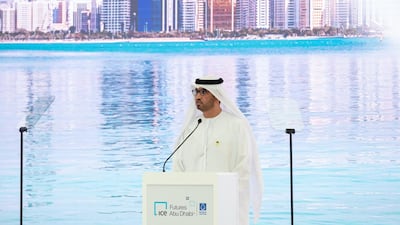Trading in Murban crude futures contracts began on Monday as the UAE's capital sets its sights on becoming a "world-class" commodities hub.
Murban, a light, sweet type of crude that is popular in Asian markets, joined Brent and West Texas Intermediate as a global benchmark after the start of trading at a commodities exchange in Abu Dhabi.
"We will establish Abu Dhabi as a world class commodities trading hub," said Dr Sultan Al Jaber, Minister of Industry and Advanced Technology and managing director and group chief executive of Adnoc.
"That is simply the case because starting today Murban futures will be freely traded from Singapore, and from Abu Dhabi to New York. In fact, whenever there is a trading screen, Murban will be on that screen."
Murban is Abu Dhabi's flagship crude grade, which flows at about 1.7 million barrels per day and accounts for half of the UAE's overall output.
One million bpd of Murban crude is available for export. The UAE, which accounts for 4.2 per cent of global crude output, has the capacity to produce 2 million bpd of Murban.
Adnoc, which produces much of the oil on behalf of the UAE, plans to raise its overall capacity to 5 million bpd by 2030. About half of that capacity will be for the production of Murban grade crude.
Murban, which began production from just one oil field in 1958, came from" humble beginnings", Dr Al Jaber said.
"Now it flows from 2,000 wells and 12 fields."
About 6,324 lots of Murban crude futures were traded by 5pm UAE time.
Murban's June contract moved in line with Brent, the international benchmark, and was down by 0.19 per cent at $63.38 per barrel by 5.56pm UAE time.
The new contract represents "a great value proposition" across the entire crude trading value chain, Dr Al Jaber said.
"[It is] a win-win for everyone involved. Customers will be able to better manage market risks, while more value will be created for producers," he added.
Contracts are traded through the ICE Futures Abu Dhabi Exchange, supported by oil companies such as Thailand’s PTT, Japan’s Eneos and Inpex, BP, Total, South Korea’s GS Caltex, PetroChina, Anglo-Dutch company Shell and Vitol.
The exchange is operated by Intercontinental Exchange, also known as ICE.
ICE is also responsible for the Brent benchmark and is the parent company of the New York Stock Exchange.
Jeffrey Sprecher, chairman of ICE, and Dr Al Jaber rang the opening bell in New York in an online ceremony on Monday to mark the occasion.
"We believe on its very first day Murban will become a globally recognised benchmark," Mr Sprecher said in a video message earlier on Monday at a launch event in Abu Dhabi.
Murban fills a void in oil trading and pricing in the Middle East, which is the biggest supplier of crude to global energy markets.
The crude grade's international role is supported by Adnoc's recent removal of destination clauses in its trade.
Adnoc's other crude grades – Upper Zakum, Das and Umm Lulu – will be priced at a differential to Murban.
The contract for future delivery can be traded 22 hours a day, five days a week.
The launch of a new crude futures contract and the setting up of a new exchange will "boost liquidity and add vibrancy" to capital markets in Abu Dhabi, according to Ahmed Al Sayegh, Minister of State and executive chairman of Abu Dhabi Global Market, where the ICE Futures Abu Dhabi exchange is based.
The launch of a futures contract for Murban will also "increase arbitrage trading opportunities, regionally and globally", Mr Al Sayegh said.
The new benchmark will allow for more options to manage risk and clear trades, he added.
"For international investors, this delivers greater and more efficient access to our region ... it means doing more business closer to home," Mr Al Sayegh said.
The trading of a new benchmark based on a single, high-quality Middle East crude will offer more "transparency" to global oil markets, particularly to customers in Asia, chief executives of international energy companies said on Monday.
"There is a lack today, in the eastern hemisphere, of a strong benchmark which is essential for developing the markets. It is for good for customers [and] good for producers," said Patrick Pouyanne, chairman and chief executive at France's Total, who attended the launch of the exchange in Abu Dhabi.
He was joined online by Bernard Looney, chief executive of BP, Takayuki Ueda, president and chief executive of Japan's Inpex, as well as Russel Hardy, chief executive of trading company Vitol, the world's largest oil-trading company.
The new Abu Dhabi exchange and the Murban benchmark will help an oil-producing region such as the Middle East "manage the risks and also to meet the growing energy demand", said Mr Looney.
Murban will now be accessible to a "larger number of customers and contribute to further economic and social development in many parts of the world including in Asia", said Mr Ueda.
Adnoc's removal of destination clauses on the trading of the crude grade was an "important thing" to help establish Murban futures trading, said Mr Hardy.
A new futures contract for Murban will "reduce the uncertainty and improve the pricing for everybody as we move forward", he said.
A free float for Murban will also help Adnoc secure the best value for its crude, said Khaled Salmeen, executive director of downstream industry, marketing and trading.
The introduction of Murban crude futures is the “latest step” in the company’s ongoing transformation to becoming a “more market- and customer-centric organisation”, he said.
Adnoc, since 2016, has adopted a more partnership-centric approach to its upstream activities, inviting oil and gas companies from its customer base in Asia to become operators of its concessions.
"By making Murban a freely traded crude, similar to Brent or WTI, customers have better price transparency, flexibility to hedge and manage risks and increased access to Murban crude,” said Mr Salmeen.
Adnoc also published the first Murban Export Availability report on its onshore subsidiary's website last month. The report will allow market participants to have an insight into available volumes for 12 months











